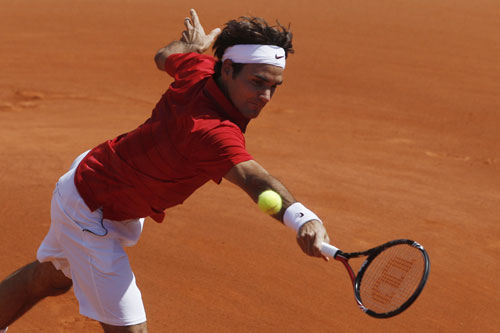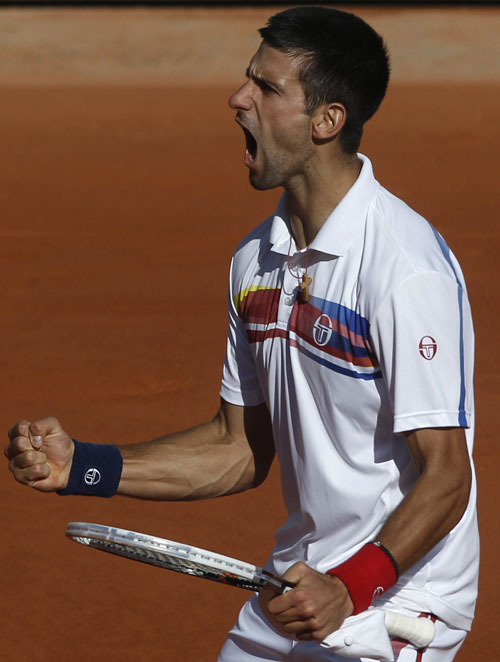
Roger Federer of Switzerland returns against his compatriot Stanislas Wawrinka in the fourth round match at the French Open tennis tournament in Roland Garros stadium in Paris, Sunday May 29. Federer won in three sets 6-3, 6-2, 7-5. (AP Photo/Michel Spingler)
PARIS—His 43rd consecutive victory complete, Novak Djokovic ripped off his white baseball cap, pivoted to look up at his parents, coach and other supporters in the stands, then let out a yell.
It was the sort of visceral reaction one might expect at the conclusion of a taut, tense contest, not the rather routine 6-4, 6-4, 6-2 result the second-seeded Djokovic assembled Sunday at the expense of No. 13 Richard Gasquet in the fourth round of the French Open.
“I didn’t expect it to be easy, that’s for sure,” said Djokovic, who briefly addressed the crowd in French, drawing laughter and cheers. “Maybe the scoreline says differently, but I really … had to work.”
Each match carries extra meaning these days for Djokovic, whose winning streak began with two Davis Cup victories in December and is the third longest since the Open era began in 1968. Now 41-0 in 2011, the Serb is one win shy of John McEnroe’s mark of 42-0 in 1984.
“As soon as he hits a return, he grabs you by the throat,” said Gasquet, a former top-10 player and 2007 Wimbledon semifinalist who was supported by a partisan crowd Sunday. “To beat him, you need to produce the perfect match and not make any mistakes.”
Roger Federer’s opponents over the years know that feeling, too. The 16-time major champion moved a step closer to a semifinal showdown against Djokovic by overwhelming No. 14 Stanislas Wawrinka 6-3, 6-2, 7-5, reaching the quarterfinals at a record 28th Grand Slam tournament in a row.
Federer next faces No. 7 David Ferrer of Spain or No. 9 Gael Monfils of France, whose fourth-round match was suspended in the fourth set because of darkness. Djokovic meets 49th-ranked Fabio Fognini of Italy, who set aside a left thigh injury that left him immobile and erased five match points to beat Albert Montanes of Spain 11-9 in the fifth set.
“I have to be honest. I didn’t think I could win the match,” Fognini said. “I couldn’t move. I couldn’t serve.”
Against Djokovic, the Italian will be facing one of the three men that have combined for 23 of the past 24 Grand Slam titles.

Serbia's Novak Djokovic celebrates his win over France's Richard Gasquet during their fourth round match of the French Open tennis tournament, at the Roland Garros stadium in Paris, Sunday, May 29. (AP Photo/Michel Spingler)
Djokovic’s contribution to that total came at the 2008 and 2011 Australian Opens. He’s long been known for his sublime two-handed backhand, service returns and movement on court. Lately, he’s improved his serve and fitness (the last thanks to a gluten-free diet he refuses to discuss in any detail).
He’s only lost serve twice through four matches at Roland Garros, and against Gasquet saved all three break points. Djokovic also broke Gasquet four times and hit more than twice as many winners, 34-16.
“He plays fast. He hits the ball really early. His return is colossal,” Gasquet said. “He’s got no weakness.”
Prodded at his news conference to name an aspect of his game he’d like to improve for the tournament’s second week, Djokovic said he’s pleased with his current level and hopes to be able to maintain it.
After improving to 9-1 against Wawrinka, his doubles partner when they won a gold medal for Switzerland at the 2008 Beijing Olympics, Federer was asked about whether he — or, say, Djokovic — ever feels unbeatable.
“You’ll definitely feel invincible at times, like with certain players who you have a great record against. … We definitely go into the match thinking, geez, something really crazy has to happen today (for me to) lose,” said Federer, whose record run of 23 straight major semifinals ended at last year’s French Open.
“The trickier part,” he added, “is, all of a sudden, you think, ‘I’m winning so much, eventually it’s going to snap that streak.’ That was the trickier part for me; when everybody started to talk about it, the more there was talk, the more likely it was going to happen. It’s kind of tough to keep your head down and just focus, really.”
The 24-year-old Djokovic appears to have mastered just that, even with so much attention and pressure on him each time he steps on court.

